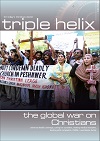Divorcing love from morality
We might assume that all those who identify as Christians in Britain share similar and predictable views on topical ethical issues. We would be wrong. Author Richard Dawkins' Foundation for Reason and Science (UK) found in a poll published in 2012 (1) that, of those who called themselves 'Christians', 62% favoured a woman's right to have an abortion within the legal time limit, 46% did not disapprove of sexual relations between two adults of the same sex and only 23% believed that sex between a man and a woman was only acceptable within marriage.
A 2011 survey of evangelical Christians, by the Evangelical Alliance, found a range of beliefs on euthanasia, homosexuality and abortion which was almost as wide. (2) However when it came to 'core' Christian doctrines like the incarnation, Christ's death and resurrection, his ascension and second coming, the authority of Scripture and justification by faith they were surprisingly orthodox. It seems that many British Christians regard ethical issues as being in the category of what the apostle Paul, in passages like 1 Corinthians 8 & 10 and Romans 14, called 'disputable matters', things on which Bible-believing Christians can legitimately disagree whilst remaining in fellowship with one another.
This view bears an uncanny resemblance to 'situation ethics', a Christian ethical theory that was principally developed in the 1960s by the then Episcopal priest Joseph Fletcher (3) who wrote ten books and hundreds of articles, book reviews, and translations. Situation ethics essentially states that other moral principles can be cast aside in certain situations if love is best served. The moral principles Fletcher was specifically referring to were the moral codes of Christianity. He believed that in forming an ethical system based on love, he was best expressing the notion of 'love thy neighbour', which Jesus Christ taught in the Gospels.
Fletcher held that there are no absolute laws other than the law of 'agape' love, meaning that all the other laws are only guidelines on how to achieve this love, and could be broken if an alternative course of action would result in more love. In order to establish his thesis he employed a number of examples of 'situations' in which it might be justified to administer euthanasia, commit adultery, steal or tell a lie. But in effectively divorcing 'agape' love from moral law, Fletcher was steering a subtly different path from Jesus himself.
Jesus indeed said that the most important commands in the Old Testament Law were love of God and neighbour. (4) (5) In fact he said these two commandments summed up the whole of Old Testament Law. (6) Furthermore he criticised the Pharisees for obeying the less important parts of the law (tithing mint and cumin) whilst neglecting the 'more important matters of… justice, mercy and faithfulness'.
But he also said that 'anyone who breaks one of the least of these commandments and teaches others to do the same will be called least in the kingdom of heaven'. (7) He reproved the Pharisees by saying that they should have 'practised the latter' (important commandments) 'without neglecting the former' (lesser commandments).
Certainly there is no place in the Gospels where Jesus implies that those commandments which deal with the shedding of innocent blood and sexual immorality (numbers six and seven of the Ten Commandments) should be disobeyed. By contrast he exhorted his disciples in the Sermon on the Mount to go beyond the mere legalities of 'you shall not murder' and 'you shall not commit adultery' to embody the very spirit of love which undergirds them. Not only no murder or adultery but no hate or lust either! (8) It is this more exacting moral standard that also underlies the ethical teaching in the epistles. Christians, having been saved by grace, (9) are exhorted to be imitators of Christ and God, (10) to walk as Christ walked (11) and to 'abstain from sinful desires'. (12)
So whilst we may say that there are situations where choosing not to shed innocent blood or to carry out a sexually immoral act requires great grace, courage, restraint and self-sacrifice, the Bible appears to give no grounds for believing that there are situations where one may choose to murder or to do something sexually immoral and claim to be acting 'in love'.
By my reading, situation ethics is a subtle distortion of biblical teaching. But it is a distortion that appears to be very much alive and well amongst British evangelicals in the 21st century. Perhaps no more clearly is it in evidence than in the shifting views and lack of clarity amongst evangelicals about sexual morality and the shedding of innocent blood.
Interestingly, Fletcher later identified himself as an atheist and was active in the Euthanasia Society of America and the American Eugenics Society and was one of the signatories to the Humanist Manifesto. When he started out, his position was barely distinguishable from orthodoxy. But he finished up in a very different place altogether. Perhaps this is a warning about what ultimately happens when we start to define 'love' differently from the way it is defined in the Bible.
































